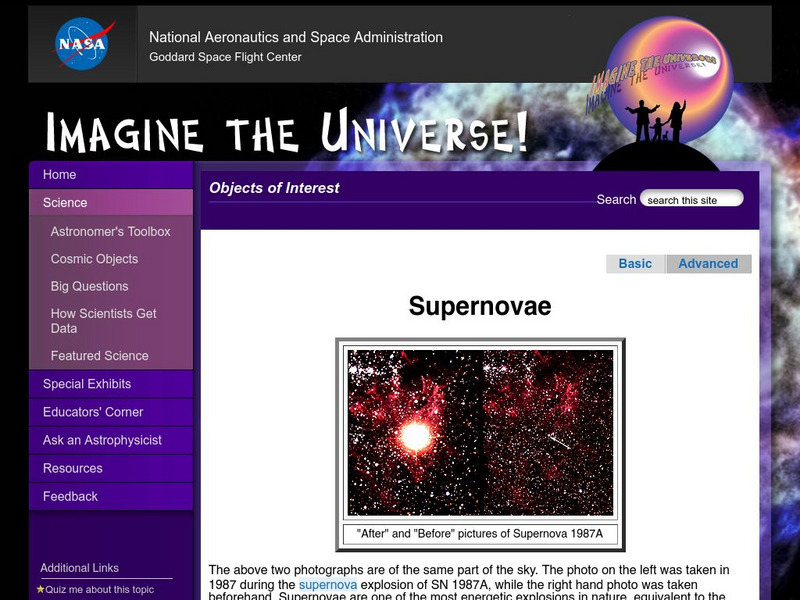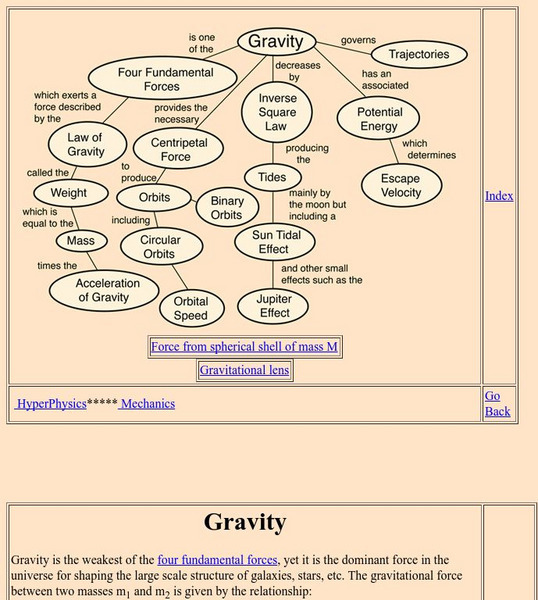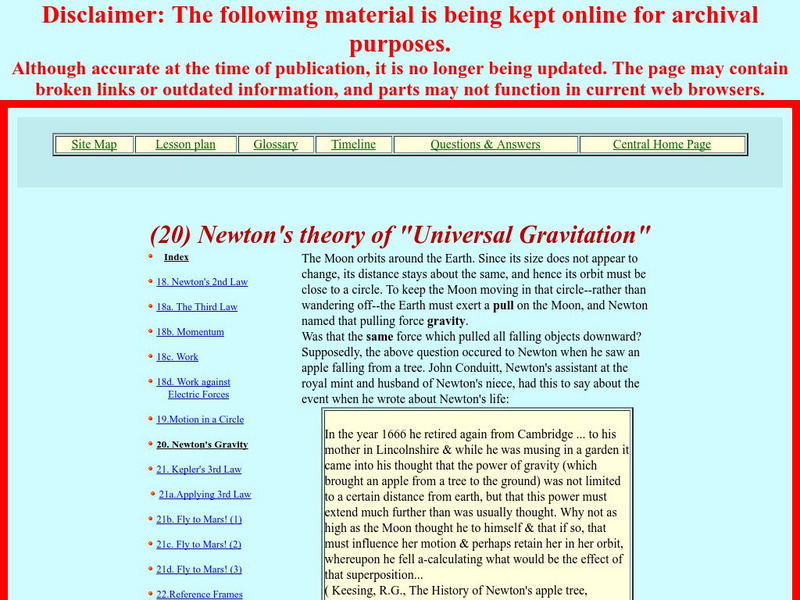Hi, what do you want to do?
Georgia Department of Education
Ga Virtual Learning: Ap Physics 1: Gravity
Combined with aspects of circular motion, students discover that Kepler's third law follows directly from the law of universal gravitation. This unit will expand upon the conservation of energy principle for problems beyond the confines...
University of Colorado
University of Colorado: Ph Et Interactive Simulations: Pendulum Lab
An interactive simulation that teaches about periodic motion, simple harmonic motion, and conservation of energy. Observe one or two pendulums to determine how the swing is influenced by the length of the string, the mass of the pendulum...
Physics Classroom
The Physics Classroom: Circular and Satellite Motion: The Value of G
In learning about the Law of Universal Gravitation, students explore the value of G, and understand why this value is so location dependent on Earth.
University of Colorado
University of Colorado: Ph Et Interactive Simulations: Gravity Force Lab
An interactive simulation that teaches about gravitational force, Newton's Third Law, and force pairs by varying properties affect the gravitational force exerted between two objects. This simulation can either be downloaded or played...
NASA
Nasa: Imagine the Universe: Supernovae (Advanced)
Supernovae are divided into two basic physical types, including a description of supernova types and how they are classified based on the existence of hydrogen spectral lines. Definitions of key terms are provided.
Georgia Department of Education
Ga Virtual Learning: A Brief History of Astronomy
In this interactive module students will explore what different ancient cultures believe was an explanation of the stars and planets. They will look at how the work of Nicolas Copernicus revolutionize the world of astronomy and learn how...
Georgia State University
Georgia State University: Hyper Physics: Kepler's Laws
An outstanding page describing Kepler's three laws of planetary motion.
CK-12 Foundation
Ck 12: Fifth Grade Science: Earth Science: Gravity
Do you know how gravity affects you? This module defines gravity and explains how gravity affects the motion of objects.
Georgia State University
Georgia State University: Hyper Physics: Gravity
Gravity as a fundamental force is explained and an equation for universal gravitation is given.
NASA
Nasa: Newton's Theory of "Universal Gravitation"
This site, which is provided for by NASA, discusses the thinking which led Newton to understand universal gravitation.
CK-12 Foundation
Ck 12: Physics: Gravitation Study Guide
This study guide on gravitation covers some key vocabulary, Kepler's Laws of Planetary Motion, and orbiting bodies or satellites. Includes important equations. It is available for download with free registration.
CK-12 Foundation
Ck 12: Plix: Gravity in the Solar System
[Free Registration/Login Required] Test your knowledge of Newton's Law of Universal Gravitation with an animation and a short quiz.
Science Education Resource Center at Carleton College
Serc: Using Microsoft Excel to Explore Gravity Forces and Accelerations
Students will learn about the force of gravity and the factors that affect it, and use and analyze the universal gravitation equation using Excel spreadsheets.
Physics Classroom
The Physics Classroom: Circular and Satellite Motion: The Inverse Square Law
Through illustrated examples and interactive practice, students explore Newton's ability to relate the cause for heavenly motion (the orbit of the moon about the earth) to the cause for Earthly motion (the falling of an apple to the...
University of Colorado
University of Colorado: Ph Et Interactive Simulations: Masses and Springs
Use this interactive, animated lab to explore conservation of mechanical energy.
Georgia State University
Georgia State University: Hyper Physics: Gravitational Potential Energy
This site defines and explains the concept of gravitational potential energy. Uses many equations and graphics to illustrate the idea. Provides an online computational practice set with immediate feedback.
Georgia State University
Georgia State University: Hyper Physics: Potential Energy
This site from Georgia State University Physics Department defines and explains the concept of potential energy. Using equations and graphics to illustrate the idea, it discusses the many types of potential energy (gravitational,...
Georgia State University
Georgia State University: Hyper Physics: Earth Orbit Velocity
A discussion and statement of an equation for orbital speed. An interactive JavaScript form allows the user to investigate the relationship between orbital height and orbital speed. A very good opportunity to practice and receive...
Cornell University
Cornell University: Astronomy: Orbital Motion and Kepler's Laws
At this site from the Astronomy Department of Cornell University, Kepler's three laws of planetary motion are stated. There are brief explanations of each, along with links to additional information on related subjects.
Upper Canada District School Board
Tom Stretton's Chemistry Pages: Universal Gravitation
Deepen your understanding about the Law of Universal Gravitation. Find out how the many scientists throughout history contributed to one of the most widely known scientific theories.
Georgia State University
Georgia State University: Hyper Physics: Circular Orbit
The necessity of gravitation to a circular orbit is discussed and equations for the orbital speed are derived from the law of universal gravitation. Binary systems in which two objects orbit about a center of mass are explained and...
University of St. Andrews (UK)
University of St. Andrews: Orbits and Gravitation
A page describing the physics, mathematics, and historical figures associated with planetary motion, satellite motion, and universal gravitation.
Physics Classroom
The Physics Classroom: Cavendish and the Value of G
A short description of how Cavendish measured the value of G - the universal gravitation constant and supported Newton's theory. Illustrated.
Physics Classroom
The Physics Classroom: Circular and Satellite Motion: Gravitational Fields
Students discover the Law of Universal Gravitation by changing the masses of planets and moons and the distance that separates them.























